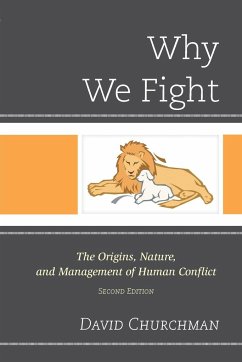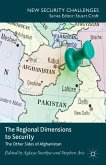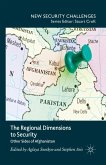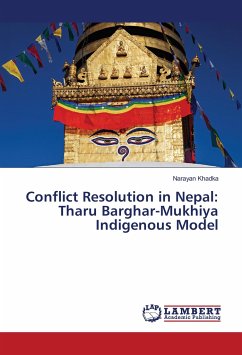- Broschiertes Buch
- Merkliste
- Auf die Merkliste
- Bewerten Bewerten
- Teilen
- Produkt teilen
- Produkterinnerung
- Produkterinnerung
This book draws on twenty-four academic disciplines to analyze some 100 theories that explain the origins, nature, and management of human conflict. It treats intellectual, moral, community, political, and international conflicts, explains the difference between good and bad theories, and discusses how to use and improve existing theories.
Andere Kunden interessierten sich auch für
![The Regional Dimensions to Security The Regional Dimensions to Security]() Aglaya SnetkovThe Regional Dimensions to Security37,99 €
Aglaya SnetkovThe Regional Dimensions to Security37,99 €![The Regional Dimensions to Security The Regional Dimensions to Security]() Aglaya SnetkovThe Regional Dimensions to Security37,99 €
Aglaya SnetkovThe Regional Dimensions to Security37,99 €![Cultural Genocide and Asian State Peripheries Cultural Genocide and Asian State Peripheries]() Cultural Genocide and Asian State Peripheries37,99 €
Cultural Genocide and Asian State Peripheries37,99 €![Interfaith Just Peacemaking Interfaith Just Peacemaking]() Interfaith Just Peacemaking81,99 €
Interfaith Just Peacemaking81,99 €![The Role of indigenous knowledge sysytems in conflict resolution The Role of indigenous knowledge sysytems in conflict resolution]() Tesfamichael TeshaleThe Role of indigenous knowledge sysytems in conflict resolution44,99 €
Tesfamichael TeshaleThe Role of indigenous knowledge sysytems in conflict resolution44,99 €![Aggression and Violence Aggression and Violence]() Aggression and Violence212,99 €
Aggression and Violence212,99 €![Conflict Resolution in Nepal: Tharu Barghar-Mukhiya Indigenous Model Conflict Resolution in Nepal: Tharu Barghar-Mukhiya Indigenous Model]() Narayan KhadkaConflict Resolution in Nepal: Tharu Barghar-Mukhiya Indigenous Model46,99 €
Narayan KhadkaConflict Resolution in Nepal: Tharu Barghar-Mukhiya Indigenous Model46,99 €-
-
-
This book draws on twenty-four academic disciplines to analyze some 100 theories that explain the origins, nature, and management of human conflict. It treats intellectual, moral, community, political, and international conflicts, explains the difference between good and bad theories, and discusses how to use and improve existing theories.
Hinweis: Dieser Artikel kann nur an eine deutsche Lieferadresse ausgeliefert werden.
Hinweis: Dieser Artikel kann nur an eine deutsche Lieferadresse ausgeliefert werden.
Produktdetails
- Produktdetails
- Verlag: Globe Pequot Publishing Group Inc/Bloomsbury
- 2nd Edition
- Seitenzahl: 338
- Erscheinungstermin: 9. Mai 2013
- Englisch
- Abmessung: 229mm x 152mm x 18mm
- Gewicht: 491g
- ISBN-13: 9780761861379
- ISBN-10: 0761861378
- Artikelnr.: 38132778
- Herstellerkennzeichnung
- Books on Demand GmbH
- In de Tarpen 42
- 22848 Norderstedt
- info@bod.de
- 040 53433511
- Verlag: Globe Pequot Publishing Group Inc/Bloomsbury
- 2nd Edition
- Seitenzahl: 338
- Erscheinungstermin: 9. Mai 2013
- Englisch
- Abmessung: 229mm x 152mm x 18mm
- Gewicht: 491g
- ISBN-13: 9780761861379
- ISBN-10: 0761861378
- Artikelnr.: 38132778
- Herstellerkennzeichnung
- Books on Demand GmbH
- In de Tarpen 42
- 22848 Norderstedt
- info@bod.de
- 040 53433511
By David Churchman
Preface Acknowledgments 1. Criteria for Good Theory Useful Empirical
Logical Falsifiable Parsimonious Generalizable 2. Conflict Analysis Three
major roles for Mathematics in Conflict Theory Risk Prisoners' Dilemma
Bayes's Theorem Lattice Theory Pareto Optimization Strategic Choice Fair
Division 3. The Nature of Man Aggression Early Man Biology of Aggression
Sociobiology Aggression in Primates 4. Aggression and the Mind Aggression
as Instinct Frustration-Aggression Aggression as Learned Behavior Human
Needs Theory Psychiatric Theories 5. Intellectual Conflict Man History
Society Nature God The Importance of Dissent 6. Moral Conflict The Origins
of Morality Individual Moral Development Four Forms of Moral Conflict
Managing Moral Conflicts 7. Interpersonal Conflict Personality and Conflict
Personality Types and their Measurement The "Generation Gap" Low Conflict
Societies Family Conflict Dual Variable Models Power Linguistic Models of
Communications Systems Models of Communication Social Models of
Communication Culture and Interpersonal Conflicts 8. Gender Conflict
Discrimination Communication Style Sexual Harassment Relational Aggression
Women in Peace and War The Matriarchal Past 9. Organizational Conflict
Organizational Development Labor-Management Conflict Leadership Crisis
Management Competitive Strategy Law of Unintended Consequences 10.
Community Conflict Class Conflict Ethnic Conflict Gangs Hostage Crises
Conflict and Stress Wisdom of Crowds 11. Political Conflict Governmental
Systems Deliberative Assemblies Voting Systems Redistricting Vote Fraud Tax
Systems Tragedy of the Commons and the Free Rider Problem 12. Causes of War
Reproductive Success Ecological Equilibrium Territorial Imperative Relative
Deprivation Nation-States Characteristics of States Number of Bordering
State Polarity Human Rights Arms Races Correlates of War Expected Utility
13. Just War in Eight Cultures The Roman Catholic Tradition The Greek
Orthodox Tradition The Jewish Tradition The Muslim Tradition The Hindu
Tradition The Buddhist Tradition The Chinese Tradition The Japanese
Tradition Just War Today 14. Interstate Conflict Origins of War Types of
War Strategic and Tactical Theory Strategic Geography 15. Asymmetric
Conflict Economic Warfare Humanitarian War Guerilla or Low Intensity
Warfare Terrorism Counter-terrorism Piracy Cyber Warfare Lawfare 16. The
Search for Peace What is Peace? Diplomacy Track II Diplomacy Department of
Peace Arms Control vs. Peace through Strength Balance of Power World
Government and Peacekeeping Pacifism and Nonviolence Reconciliation Is
Mankind Becoming Increasingly Peaceful? 17. Dispute Resolution Torts
Negotiation Distributive Negotiation Integrative Negotiation Third-Party
Interventions Large-scale Third Party Intervention The Agreement Circumplex
18. Putting Conflict Theory to Use 19. Improving Conflict Theory Appendix:
Major Fallacies in Logic Bibliography Index Author Biography
Logical Falsifiable Parsimonious Generalizable 2. Conflict Analysis Three
major roles for Mathematics in Conflict Theory Risk Prisoners' Dilemma
Bayes's Theorem Lattice Theory Pareto Optimization Strategic Choice Fair
Division 3. The Nature of Man Aggression Early Man Biology of Aggression
Sociobiology Aggression in Primates 4. Aggression and the Mind Aggression
as Instinct Frustration-Aggression Aggression as Learned Behavior Human
Needs Theory Psychiatric Theories 5. Intellectual Conflict Man History
Society Nature God The Importance of Dissent 6. Moral Conflict The Origins
of Morality Individual Moral Development Four Forms of Moral Conflict
Managing Moral Conflicts 7. Interpersonal Conflict Personality and Conflict
Personality Types and their Measurement The "Generation Gap" Low Conflict
Societies Family Conflict Dual Variable Models Power Linguistic Models of
Communications Systems Models of Communication Social Models of
Communication Culture and Interpersonal Conflicts 8. Gender Conflict
Discrimination Communication Style Sexual Harassment Relational Aggression
Women in Peace and War The Matriarchal Past 9. Organizational Conflict
Organizational Development Labor-Management Conflict Leadership Crisis
Management Competitive Strategy Law of Unintended Consequences 10.
Community Conflict Class Conflict Ethnic Conflict Gangs Hostage Crises
Conflict and Stress Wisdom of Crowds 11. Political Conflict Governmental
Systems Deliberative Assemblies Voting Systems Redistricting Vote Fraud Tax
Systems Tragedy of the Commons and the Free Rider Problem 12. Causes of War
Reproductive Success Ecological Equilibrium Territorial Imperative Relative
Deprivation Nation-States Characteristics of States Number of Bordering
State Polarity Human Rights Arms Races Correlates of War Expected Utility
13. Just War in Eight Cultures The Roman Catholic Tradition The Greek
Orthodox Tradition The Jewish Tradition The Muslim Tradition The Hindu
Tradition The Buddhist Tradition The Chinese Tradition The Japanese
Tradition Just War Today 14. Interstate Conflict Origins of War Types of
War Strategic and Tactical Theory Strategic Geography 15. Asymmetric
Conflict Economic Warfare Humanitarian War Guerilla or Low Intensity
Warfare Terrorism Counter-terrorism Piracy Cyber Warfare Lawfare 16. The
Search for Peace What is Peace? Diplomacy Track II Diplomacy Department of
Peace Arms Control vs. Peace through Strength Balance of Power World
Government and Peacekeeping Pacifism and Nonviolence Reconciliation Is
Mankind Becoming Increasingly Peaceful? 17. Dispute Resolution Torts
Negotiation Distributive Negotiation Integrative Negotiation Third-Party
Interventions Large-scale Third Party Intervention The Agreement Circumplex
18. Putting Conflict Theory to Use 19. Improving Conflict Theory Appendix:
Major Fallacies in Logic Bibliography Index Author Biography
Preface Acknowledgments 1. Criteria for Good Theory Useful Empirical
Logical Falsifiable Parsimonious Generalizable 2. Conflict Analysis Three
major roles for Mathematics in Conflict Theory Risk Prisoners' Dilemma
Bayes's Theorem Lattice Theory Pareto Optimization Strategic Choice Fair
Division 3. The Nature of Man Aggression Early Man Biology of Aggression
Sociobiology Aggression in Primates 4. Aggression and the Mind Aggression
as Instinct Frustration-Aggression Aggression as Learned Behavior Human
Needs Theory Psychiatric Theories 5. Intellectual Conflict Man History
Society Nature God The Importance of Dissent 6. Moral Conflict The Origins
of Morality Individual Moral Development Four Forms of Moral Conflict
Managing Moral Conflicts 7. Interpersonal Conflict Personality and Conflict
Personality Types and their Measurement The "Generation Gap" Low Conflict
Societies Family Conflict Dual Variable Models Power Linguistic Models of
Communications Systems Models of Communication Social Models of
Communication Culture and Interpersonal Conflicts 8. Gender Conflict
Discrimination Communication Style Sexual Harassment Relational Aggression
Women in Peace and War The Matriarchal Past 9. Organizational Conflict
Organizational Development Labor-Management Conflict Leadership Crisis
Management Competitive Strategy Law of Unintended Consequences 10.
Community Conflict Class Conflict Ethnic Conflict Gangs Hostage Crises
Conflict and Stress Wisdom of Crowds 11. Political Conflict Governmental
Systems Deliberative Assemblies Voting Systems Redistricting Vote Fraud Tax
Systems Tragedy of the Commons and the Free Rider Problem 12. Causes of War
Reproductive Success Ecological Equilibrium Territorial Imperative Relative
Deprivation Nation-States Characteristics of States Number of Bordering
State Polarity Human Rights Arms Races Correlates of War Expected Utility
13. Just War in Eight Cultures The Roman Catholic Tradition The Greek
Orthodox Tradition The Jewish Tradition The Muslim Tradition The Hindu
Tradition The Buddhist Tradition The Chinese Tradition The Japanese
Tradition Just War Today 14. Interstate Conflict Origins of War Types of
War Strategic and Tactical Theory Strategic Geography 15. Asymmetric
Conflict Economic Warfare Humanitarian War Guerilla or Low Intensity
Warfare Terrorism Counter-terrorism Piracy Cyber Warfare Lawfare 16. The
Search for Peace What is Peace? Diplomacy Track II Diplomacy Department of
Peace Arms Control vs. Peace through Strength Balance of Power World
Government and Peacekeeping Pacifism and Nonviolence Reconciliation Is
Mankind Becoming Increasingly Peaceful? 17. Dispute Resolution Torts
Negotiation Distributive Negotiation Integrative Negotiation Third-Party
Interventions Large-scale Third Party Intervention The Agreement Circumplex
18. Putting Conflict Theory to Use 19. Improving Conflict Theory Appendix:
Major Fallacies in Logic Bibliography Index Author Biography
Logical Falsifiable Parsimonious Generalizable 2. Conflict Analysis Three
major roles for Mathematics in Conflict Theory Risk Prisoners' Dilemma
Bayes's Theorem Lattice Theory Pareto Optimization Strategic Choice Fair
Division 3. The Nature of Man Aggression Early Man Biology of Aggression
Sociobiology Aggression in Primates 4. Aggression and the Mind Aggression
as Instinct Frustration-Aggression Aggression as Learned Behavior Human
Needs Theory Psychiatric Theories 5. Intellectual Conflict Man History
Society Nature God The Importance of Dissent 6. Moral Conflict The Origins
of Morality Individual Moral Development Four Forms of Moral Conflict
Managing Moral Conflicts 7. Interpersonal Conflict Personality and Conflict
Personality Types and their Measurement The "Generation Gap" Low Conflict
Societies Family Conflict Dual Variable Models Power Linguistic Models of
Communications Systems Models of Communication Social Models of
Communication Culture and Interpersonal Conflicts 8. Gender Conflict
Discrimination Communication Style Sexual Harassment Relational Aggression
Women in Peace and War The Matriarchal Past 9. Organizational Conflict
Organizational Development Labor-Management Conflict Leadership Crisis
Management Competitive Strategy Law of Unintended Consequences 10.
Community Conflict Class Conflict Ethnic Conflict Gangs Hostage Crises
Conflict and Stress Wisdom of Crowds 11. Political Conflict Governmental
Systems Deliberative Assemblies Voting Systems Redistricting Vote Fraud Tax
Systems Tragedy of the Commons and the Free Rider Problem 12. Causes of War
Reproductive Success Ecological Equilibrium Territorial Imperative Relative
Deprivation Nation-States Characteristics of States Number of Bordering
State Polarity Human Rights Arms Races Correlates of War Expected Utility
13. Just War in Eight Cultures The Roman Catholic Tradition The Greek
Orthodox Tradition The Jewish Tradition The Muslim Tradition The Hindu
Tradition The Buddhist Tradition The Chinese Tradition The Japanese
Tradition Just War Today 14. Interstate Conflict Origins of War Types of
War Strategic and Tactical Theory Strategic Geography 15. Asymmetric
Conflict Economic Warfare Humanitarian War Guerilla or Low Intensity
Warfare Terrorism Counter-terrorism Piracy Cyber Warfare Lawfare 16. The
Search for Peace What is Peace? Diplomacy Track II Diplomacy Department of
Peace Arms Control vs. Peace through Strength Balance of Power World
Government and Peacekeeping Pacifism and Nonviolence Reconciliation Is
Mankind Becoming Increasingly Peaceful? 17. Dispute Resolution Torts
Negotiation Distributive Negotiation Integrative Negotiation Third-Party
Interventions Large-scale Third Party Intervention The Agreement Circumplex
18. Putting Conflict Theory to Use 19. Improving Conflict Theory Appendix:
Major Fallacies in Logic Bibliography Index Author Biography








